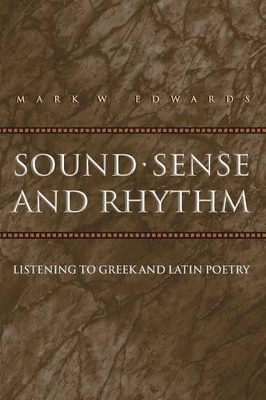
Sound, Sense, and Rhythm
Princeton University Press (Verlag)
978-0-691-11784-3 (ISBN)
This book concerns the way we read--or rather, imagine we are listening to--ancient Greek and Latin poetry. Through clear and penetrating analysis Mark Edwards shows how an understanding of the effects of word order and meter is vital for appreciating the meaning of classical poetry, composed for listening audiences. The first of four chapters examines Homer's emphasis of certain words by their positioning; a passage from the Iliad is analyzed, and a poem of Tennyson illustrates English parallels. The second considers Homer's techniques of disguising the break in the narrative when changing a scene's location or characters, to maintain his audience's attention. In the third we learn, partly through an English translation matching the rhythm, how Aeschylus chose and adapted meters to arouse listeners' emotions. The final chapter examines how Latin poets, particularly Propertius, infused their language with ambiguities and multiple meanings. An appendix examines the use of classical meters by twentieth-century American and English poets.
Based on the author's Martin Classical Lectures at Oberlin College in 1998, this book will enrich the appreciation of classicists and their students for the immense possibilities of the languages they read, translate, and teach. Since the Greek and Latin quotations are translated into English, it will also be welcomed by non-classicists as an aid to understanding the enormous influence of ancient Greek and Latin poetry on modern Western literature.
Mark W. Edwards is Emeritus Professor of Classics at Stanford University. He is the author of "Homer: Poet of the Iliad" and Volume 5 of "The Iliad: A Commentary".
Preface ix CHAPTER ONE: Homer I: Poetry and Speech 1 The Older Discoveries: Frankel and Parry 2 The New Theories. Functional Grammar and the Grammar of Speech 9 Homeric Style in Tennyson's Morte d'Arthur 14 Homeric Style in the Duels of Achilles 18 CHAPTER TWO: Homer 11: Scenes and Summaries 38 The Book Divisions 39 The Paragraph Divisions 47 Joining Episode to Episode 53 Continuity and Oral Poetics 58 CHAPTER THREE: Music and Meaning in Three Songs of Aeschylus 62 The First Choral Song (Agamemnon 104-257) 71 The Second Choral Song (Agamemnon 367-488) 81 The Third Choral Song (Agamemnon 681-781) 88 The Rest of the Agamemnon, and of the Trilogy 95 CHAPTER FOUR: Poetry in the Latin Language 99 Latin Word Order 99 Ambiguity in Latin Verse 105 Propertius 1.19 109 AFTERWORD 125 APPENDIX A: Tennyson's Morte d'Arthur 129 APPENDIX B: " Continuity in Mrs. Dalloway 149 APPENDIX C: The Performance of Homeric Episodes 151 APPENDIX D: Classical Meters in Modern English Verse 166 REFERENCES 179 INDEX 189
| Erscheint lt. Verlag | 25.1.2004 |
|---|---|
| Reihe/Serie | Martin Classical Lectures |
| Verlagsort | New Jersey |
| Sprache | englisch |
| Maße | 152 x 235 mm |
| Gewicht | 312 g |
| Themenwelt | Geisteswissenschaften ► Sprach- / Literaturwissenschaft ► Anglistik / Amerikanistik |
| Geisteswissenschaften ► Sprach- / Literaturwissenschaft ► Literaturwissenschaft | |
| ISBN-10 | 0-691-11784-5 / 0691117845 |
| ISBN-13 | 978-0-691-11784-3 / 9780691117843 |
| Zustand | Neuware |
| Haben Sie eine Frage zum Produkt? |
aus dem Bereich


